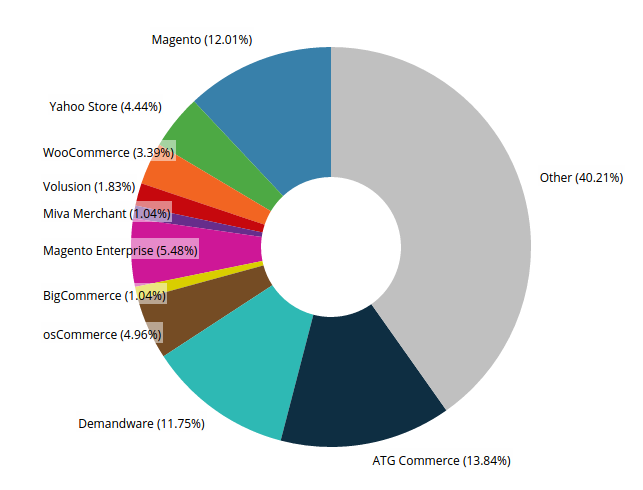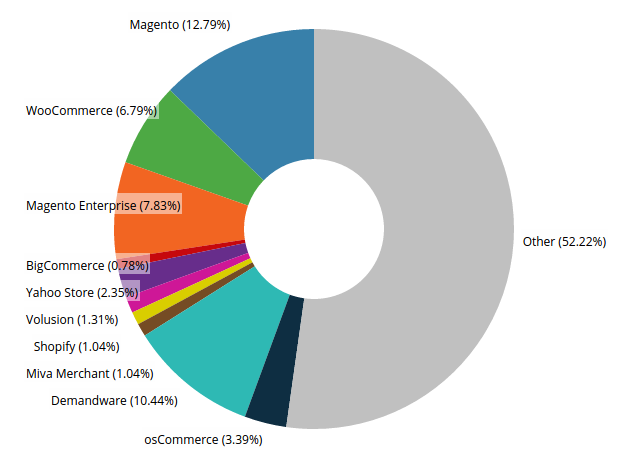Magento and WooCommerce are currently the top two frameworks in use for e-commerce websites over the web. Both are backed by strong open-source communities developing plugins for various functionalities a shopping site might need - Magento, through Magento Connect and Woocommerce, through being an all-out open-source themed marketplace. Owing to these and many other factors, it sometimes becomes overwhelming to tackle the question - Which one to use for my shopping site?!
Nevertheless, there are certain scenarios in which one becomes preferable over the other. The objective of this article is to help you figure out exactly that - When to use What?
Again, these two are NOT the only ones but for the purpose of this article, were keeping our focus on the top two players only.
So.
First off, both are based on the Freemium model which means one can start in a jiffy with core features which make a site, a shopping site. These features are Product Listings, a shopping cart and a payment gateway. Both Magento and WooCommerce provide the first two free of cost, but in order to have the Payment Gateway (and other specific features you may require), youll need to purchase additional plugins from their respective marketplaces or third party vendors. Again, these plugins are developed by the open-source community and some are free but mostly they are paid. The paid, being an incentive for the open-source community to contribute more and more options which can be integrated with these platforms. So, the bottomline here is, if you want to differentiate yourself, there are options galore, but youll need to pay more!
I know, still the basic question remains, which one to choose? Not too long ago, it used to be an easy decision:
-
I am a small business with limited products - Woocommerce it is!
-
I own multiple stores - Magento
-
I am on WordPress - WooCommerce!
-
I am a Wordpress Champion and can tweak a thing or two here and there - WooooooCommerce!
-
I am medium/large enterprise with deep fat pockets and super geeky team and big plans - Hello, Magento!
-
I need my tech support to be handled by pros - Magento
-
And so on...

The above qualifiers still apply but with both now growing and multiplying their feature lists like rabbits on mission (especially WooCommerce), it needs a little more in-depth analysis for mapping your needs to what each has to offer.
Before we move on to the deciding factors, here is a comparison of market shares of leading e-commerce tools, as on May 30th 2014 and May 2015.

Heres how it was on May 30th, 2014 (Top 10K sites)

Heres how it is in May 2015 (Top 10K sites)
Source: builtwith.com
From the above charts, we can see that, in the last one year Woocommerce has doubled its market share (from ~3.5% to ~7%) amongst the top 10K eCommerce sites (that can well be the reason that Automattic, the company that owns WordPress, has recently acquired WooCommerce for a reported 30 million USD). On the other hand, Magento stays put in its #1 position with not much movement in its percentage share.
But that doesnt mean much has changed on the factors which differentiate Magento and WooCommerce. Both still have their applications primarily based on the same factors which we mentioned earlier. In a nutshell, Magento is still the first easy choice for big enterprises and WooCommerce is still the goto solution for small businesses.
Lets see the basic points one needs to consider for arriving at a decision. I consider these factors important, in no specific order:-
-
Responsiveness (the world is going mobile!)
-
Backend framework (or the platform you are on)
-
Scalability needs of your business
-
Your technical background
-
The amount of the wealth youve inherited (read, finance)
Lets consider these one by one now.
The fact that most businesses are moving towards responsive mobile sites, having a tool which can fit into that requirement helps. WooCommerce being a plugin for WordPress easily takes care of that while Magento may require a lot of additional tweaking and customizing to achieve responsiveness.
But then, if youre not a WordPress user, WooCommerce is almost totally a no-go. Your only easy option is to migrate your site out of WordPress but that might mean a big effort and cost and headaches as a result of all the dirty work of purchasing/transferring domains, hosting, repeating all the work which you had done when you decided to go for WordPress earlier. Most big brands straightaway avoid these headaches though. Owing to their specific and complex requirements, they prefer to have their websites built from scratch, instead for going the template ways and so normally fall-out of the WordPress option, which in turn leaves them with clear choice of going for a standalone full-fledged integrable product like Magento. But again, if you are a business who runs his operations on a WordPress site and is content with it, it becomes a fairly easy choice for you as well. So essentially, the backend (WordPress or a Custom Developed system) plays a big role in deciding whether you want to go the Magento way or the WooCommerce way.
Then there is a factor of scalability. You might be a small fish now with 2 to 2000 products but what about if your site picks up and you decide to sell not only your cute little hand-knitted socks but everything from sea-shells to fancy yachts...I know, I know...but the point here is, what if you decide to scale? WooCommerce can be a little tricky to accommodate this little detail. So if you foresee yourself in the foreseeable future (if that is a thing) getting big (like 30000 products), you might need to think twice before deciding to go the free way. However, there are a few big stores like soulbrother.com built on Woocommerce having 30000 odd products (damn...there are always exceptions!)
Then, there is the technicality issue. Magento has a general reputation of being a pain-in-the-neck (really, with those long hours spent on your machine trying to figure out the way to display the photo of your cute little socks) for the people with poor technical background. You need a solid backend team to run and support a Magento based site, period. WooCommerce, on the other hand, is mostly a boon if you are after instant gratification (relatively, of course).
Last but certainly not the least is the financial factor. WooCommerce is cheap (at least initially) and Magento is not so much. Most advanced features on both platforms are paid...and expensive, with Magento again being a little more expensive. So, theres that. But the cost is not for nothing. Magento is still the number one choice for serious e-commerce business because it provides advanced functionalities with full technical support as an out-of-the-box offering where WooCommerce may lack (this is actually where Magento scores big over Woocommerce).
So, this covers the basic points (mobile compatibility, backend CMS, scalability, technical know-how and finance) one needs to consider while deciding which one of the two biggest e-Commerce tools one should go for. If you can answer these points clearly in your head, it shouldnt be a hard decision as to which to choose - Magento or WooCommerce.
With that, I wish you good luck, hopefully Ill buy from you one day!
0 Comment(s)